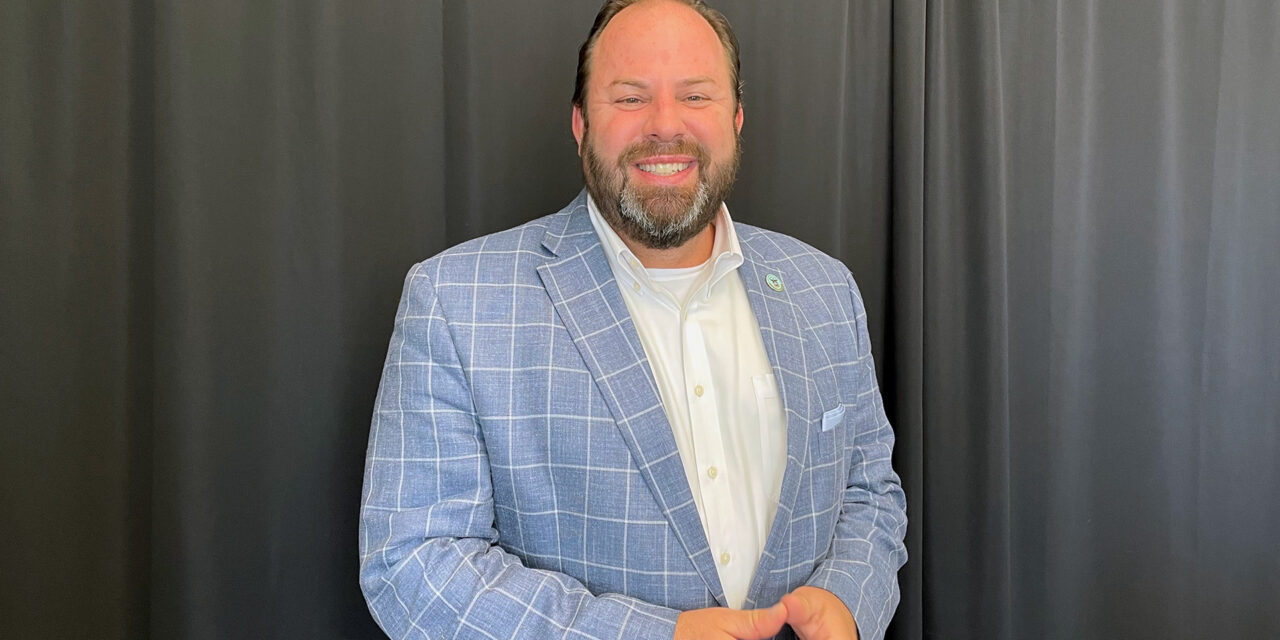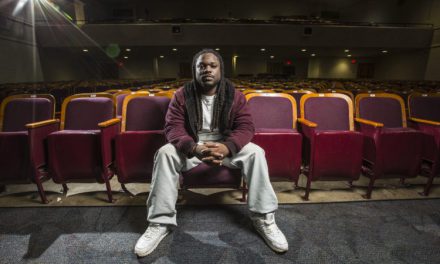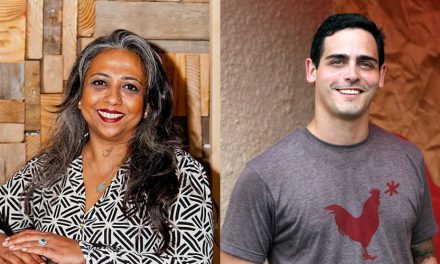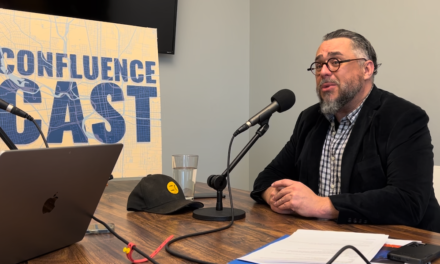Podcast: Play in new window | Download
Subscribe: RSS
Tim Fulton 00:07
Ladies and gentlemen, welcome to the confluence cast presented by Columbus underground. We are a weekly Columbus centric podcast focusing on the civics, lifestyle, entertainment, and people of our city. I’m your host Tim Fulton this week. In anticipation of this fall’s election, the confluence cast is endeavoring to introduce Columbus voters to the 12 Council and two mayoral candidates in their own words. Today, Emmanuel Remi, incumbent and candidate for Columbus City Council, District Four discusses his work as a neighborhood advocate, the importance of a diverse Council and the appointment process that has defined council for so long. You can get more information on what we discussed today in show notes for this episode at the confluence cass.com. Enjoy the interview. Sitting down here with Columbus city councilman Emanuel Remi, how are you sir?
Emmanuel Remy 01:04
Great. How are you today?
Tim Fulton 01:05
I’m doing well. I’m doing well. You are currently a candidate for the newly formed Columbus City Council District Four. First of all, tell us about yourself and what brings you to your candidacy?
Emmanuel Remy 01:17
Absolutely. I had the distinct pleasure of leading in the Northland area for Oh, since roughly around 2010 lady got me involved with my neighborhood association, by the way, you need to go to Northland and next thing, you know, I raised my hand and became president. It was great, you know, 16% of the city at that time, it was about 130,000 people now it’s grown, you know exponentially one of the fastest growing parts of the community because of the type of housing stock and the affordability in the area. But once upon a time, I had a pastor that sat in the crowd and said, Hey, you got to go for the seat on council, you run a great meeting, you are very level set, you know, level minded and so I said, that’s not a bad idea. Okay. So because politics wasn’t, you know, that wasn’t my thing. And so, community advocacy, you know, the champion and neighborhood that was and building coalitions because I felt like, if I worked with the Clint Ville area Commission, or the North London area Commission, or any surrounding Commission, we could do more with the people down at the city hall. So went ahead and applied, went down and thought while I was on the Board of Realtors at the time had Board of Directors of the realtors and I thought, well, I got this type of support. That should be enough. Well, I didn’t realize the extent of what it meant to really have coalition behind you and that sort of thing. So I took the opportunity to build. I didn’t get it that time. That was okay, got it. Yeah, here’s what happened. Yeah, right. Herschel Craig was elected into the state house. And so that was the seat that I was going for Gize a page ended up Yeah. And so I continued the work because I thought this would be kind of a great extension of what I was doing in Northland. So I went out, and just if you told me to go meet with so and so I went and met with them, and they told me to go meet and I just continued to do it. It was an investment, to ultimately, hopefully get the role, but had it not happened. I kept saying to myself, listen, you met, you know, most of the people that make a difference in this community. So you know, it’s not for not, it’s not, it’s not a bad thing. So when again, in to believe is 2016. And that was what it was, because that was when Eileen Paley got elected, a judge did that I was having lunch with stinziano. He said, By the way, do you know that Mitch Brown is his name? And I was like, Well, I’m pretty Garin, I’m pretty much guaranteed. I’m not gonna get it this time. Okay. And so finally, when Zach Klein was elected to City Attorney, I was like, This is it because if I don’t get it this time, I gotta go back and sell houses. My wife’s gonna kill me. Okay. So I’m a realtor, by by the way. So fortunately, my colleagues selected me and it’s been just a great journey, so far the opportunity to work and be a neighborhood advocate. You know, I feel like, you know, most people have seen me in their neighborhood over and over and over again. And that’s just what I enjoyed doing. And so definitely look at it from a different lens and some of my colleagues and that’s what’s the beauty of our body is that everybody brings a different perspective, and I think that collaboratively we get the whole picture.
Tim Fulton 04:36
Okay. A little bit about your just general bio, you’re from Worthington. You did College up in Michigan. You’re a realtor by trade anything. I’m missing sort of internal I mean,
Emmanuel Remy 04:49
although I would point out that we lived in Columbus just to Worthington school so one of the Whoa when when part of the community raised by a single mother couldn’t afford a big house and Worthington but live To up at Worthington woods in Worthington, Galena, and a rental that we had up there was a townhome. So that was my journey. And then up to Michigan, like I said, and then when I met my wife in 2010, or 2000, excuse me, we we decided eventually, to come back to Columbus and make Columbus our home.
Tim Fulton 05:17
Gotta talk me through some of the issues you think Columbus is facing, and how you do and how you will deal with that on council.
Emmanuel Remy 05:27
I think, you know, first and foremost, rapid growth causes great opportunity creates great opportunity. However, it also causes, you know, pains, and those are things that elected leaders really have to grapple with, and making sure that there’s space for all of us to thrive in this community. And, you know, that’s where the opportunity is, is to try to capitalize on this growth and the opportunities that it can bring, but we gotta wait, make sure that you if you’re working here, no matter what type of job it is, you have the opportunity to live here, raise your family, you know, and be in this community. So those are the challenges, you know, from I am the public safety chair. Okay. And so, you know, my mind is constantly thinking about this concept of safety people. It’s a feeling right, you know, people deserve the right to feel safe in their neighborhood. And so that is something that I’m constantly thinking about, like, and it’s not something unfortunately, with society today that we’re going to police our way out of, it is not something that government can do everything, you know, to solve this problem. It’s really a collaborative effort of getting together with faith leaders, area leaders, neighbors, grandparents, grandchildren, you know, it’s everybody coming together and saying, Look, we’re not going to tolerate this in our community anymore. Enough, is enough.
Tim Fulton 06:54
Okay, the districting system? How do you feel about it? I also want and forgive me, this is a bit of a curveball. But I think you’re a really good example, to sort of pointed out, most folks who are on Council were appointed rather than elected, and then they ran for re election, you went through that process a couple of times, or at least, maybe considered it the second time and then ended up being appointed, talk through the new districting system, maybe through that lens, and be as Frank as you can about it. Right. Like, how do you feel about the new districting system? Is it good? And also sort of the I don’t want to put too much on it, but it sort of feels like the construction of what Ken Council is.
Emmanuel Remy 07:49
So there’s a lot there. So, you know, we’ll we’ll unpack it a little bit. It’s a very unique system, as we’re well aware. Yeah. I use that argument when I was trying to get on the council. Okay. Hadn’t had anybody from the northern area in decades. And, you know, I tried to say, suggest that it made sense to have somebody from that part of the community. Yeah. Because and I use this argument, and it stands true today with this new district. You know, when somebody’s on council at the time, I remember sitting in the interview, and a council member said, it doesn’t matter. We could all live in the same building or the same neighborhood and it doesn’t matter. I said, Yeah, but when you live in a neighborhood, right, you know, where the potholes are, you know, where that signs broken, you are very intimate with your own community. I am a little better than most, I would argue, you know, at the time, at least, I was a realtor that sold in every stretch of the Imad, you know, every street you can imagine. I did BPOS which are broker price opinions are just many appraisals at the time. Okay. During the 2010 2011. Two, I did 1000s of them. So I was on every street, you know, I met Lisa Boggs. In fact, if you’re familiar on the, on the hilltop, who’s a great advocate for, you know, cleanups in the community, I met her handing out fliers while I was doing a doing a foreclosed listing up there on Ogden, which is the street that she lives on. So I had a great familiarity with every street, you know, in the community, but not everybody does that, you know, we’re taught as realtors that you never go the same way twice, you know, you go one way and drive the other way. I mean, it’s this makes sense. You want to get to be familiar with the community. And so when we think about this districting I think it does provide a better lens. When you think about it, but our community our residents don’t lose the advocacy. I remember sitting in 2017 Not on council sitting through the the discussions in the community and we were in London and these ladies these two ladies from linens as I said, I don’t want to go hybrid or district I like Seven people I can call to bug about whatever issue it is. And of course, we’re expanding to nine. And the same will hold true, it doesn’t matter where they live. But for some, it is a good place to start. And we also, I, in particular, don’t want to get into a horse trading situation where a, I live over here, I need your help getting my thing passed, and then down the road, I’ll scratch your back. It’s just not. That’s not who Columbus is. And and hopefully, it means that people get greater representation without having to lose anything in the process.
Tim Fulton 10:37
Talk me through then the and I realized that Sir, it is a very separate issue, but the the appointment process, because that’s not I don’t imagine really going to change much that folks are able to go ahead, and the current city council basically chooses who they’d like to join them. And then yes, folks do have to come up for reelection. But that’s it’s pretty difficult to unsee. Right? How do you feel about that, especially being somebody who went through that process a couple of times?
Emmanuel Remy 11:11
Absolutely. Understand the concerns, understand why people hate it. We don’t like it, you know, it’s one of those things where you kind of cringe if you know that a colleagues leaving, and then you have to go through that process. So we you’ve seen us, like, create a placeholder system, you know, somebody like Mitch Brown, which, again, that has its own set of criticisms, like, well, you should get somebody in there that can really make a difference. But the reality is it’s multibillion dollar budgets, whether it’s operating capital, there’s a lot to learn, it takes a while to really, you know, get over some of the newness. And so when you only got a certain amount of time, sometimes an elder statesman makes sense. I will just say this is that in an ideal world, you would hold a special election, you’d fill the role, the reality of it is to hold a special election in the city of Columbus, it’s over a million dollars. And so is that what taxpayers want? You know, is that, is that a good use of resources to fill that role? You know, I’m not going to answer that question right now. You know, I think that’s for your listeners to decide. But I would say that, you know, that is the thing that holds people back from doing it is the immense amount. Now, the Statehouse forced a special election on us here in August. Yeah. And really didn’t help us out much financially in order to do it. And it’s kind of on your on your own. So that’s the that’s the flip side of it, and why it’s not as easy as just, let’s just have an election. So
Tim Fulton 12:38
I think that’s fair. And I also do think that the appointment, Michel Brown is actually a reflection of hearing that critique. That’s why you chose somebody that wasn’t just going to immediately stand for reelection. Final big question, big bucket of a question. What value proposition do you bring to your office? And basically, why should people vote for you?
Emmanuel Remy 13:00
Well, I believe that, you know, my passion, I’ve watched people burn out in this role predecessors. Okay. And my passion is still as strong today as it was the first day. And so I think that’s something you should look for in any person that’s in the role. I, I believe that we’re making substantive, substantive changes in this community where you see a council that is kind of, it’s a strong mayor, strong Council system. And so we were saying, hey, this isn’t just the mayor’s, you know, show to run, and you see us constantly working to take back some of the budgetary, you know, we’re just articulating our vision as well. Yeah, I guess is what I would say. And so we have really progressive ideas that we’d like to continue to push and try to develop. And, you know, for me, we have a great new police chief, we have an outstanding fire chief. And the more that I can get them collaborating together and out in the community, because we spent well over a decade with this division of police in a with a dispatching system and the way that they patrol that they didn’t patrol the same neighborhood twice. When you lose touch with the people that are working the streets, I mean, little things become big things really quick. And so our officers know now that, you know, they gotta be community oriented, they got it spend some time in the community. And as we continue to add staff, you’ll see more and more of that. And so I’m excited to, you know, help to facilitate that, you know, bring that neighborhood lens every single day into City Hall. I think as the responsibility of a council member is not only to be clumb, one of Columbus’s biggest cheerleaders, but also to constantly look for ways to remove the red tape and the barriers that they’re that exist in dealing with government. And, you know, that’s what I like to do. Working with the administration, taking some of the, you know, there’s people over there that are lifelong bureaucrats, and they, their main focus is not necessarily on helping the person on the street. So I get to be that advocate, I get to be the person that really says, No, wait a second, that’s not the right thing to do. You need to you need to take care of this. And so I’m proud to be in that role. And so love to continue, voters willing, and look forward to the opportunity to continue to help Columbus grow in a way that’s sensible. For every resident in the city of Columbus,
Tim Fulton 15:40
I end every interview with two pretty straightforward questions. What do you think Columbus is doing? Well, and what do you think Columbus is not doing so well.
Emmanuel Remy 15:52
I think we are constantly working to develop policy relating to housing to be inclusive. We are ahead of the curve to some of our peer cities, even at the point where they were at this point, many of them lost the battle and you know, substantial, substantial problems. But we need to accept the fact that we are under building significantly. And so we just had a meeting this afternoon, talking about the fact that we need to get everybody on board housing needs to be championed by all and it doesn’t matter. I mean, we need we need champions at the, you know, for housing affordability, all the way up to you know, the greatest market rate housing that there is, we’d simply need more units in the city of Columbus, because people are coming whether we want them to or not. And so, you know, if we’re creating way more jobs, and we are, you know, housing units, we are going to not the battle is going to get harder and harder to fight. And so, you know, you see us working on zoning and read, you know, redesign of our zoning that hasn’t been touched and set over 70 years. We’re working to, you know, make sure that we have transportation options, and that’ll be like, the LinkedIn, US LinkedIn project next year. Link link us Yeah. Thinking about No, I get it. Yeah, link, the link us we need that, you know, we need that to come through. And so these are things that when you have a rapidly growing city, if you’re not pushing, you know, simultaneously, then you really will end up underwater and that’s what we don’t want.
Tim Fulton 17:37
Got it. Thank you for your time.
Emmanuel Remy 17:39
I appreciate it. Thank you.
Tim Fulton 17:51
Thanks for listening to the confluence cast presented by Columbus underground. Again, you can get more information on what we discussed today in the show notes for this episode at the confluence cast.com Please rate subscribe, share this episode of The confluence cast with your friends, family, contacts, enemies, your favorite neighborhood advocate. If you’re interested in sponsoring the confluence cast, get in touch with us. We can be reached by email at info at the confluence cast.com Our theme music is composed by Benji Robinson, our producers Phillip Cogley, I’m your host, Tim Fulton. Have a great week.





